七年级英语上册module7computers主题阅读(新版)外研版
七年级英语上册Module7Computers课件(新版)外研版
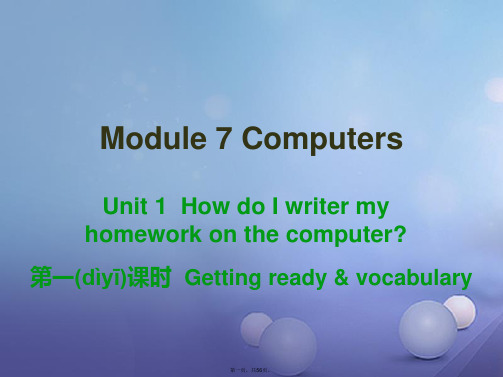
Unit 1 How do I writer my homework on the computer?
第一(dìyī)课时 Getting ready & vocabulary
第一页,共56页。
课前导(qiándǎo)学
核心单词
keyboard
1. ________ n. 键盘
—OK, I will.
A. turn on
B. turn up
C. turn down
D. turn off
( )2. It is a bit hot, can you ________ the window?
C A. turn on
B. turn off
C. open
D. close
第十二页,共56页。
4. _______________ 保存(bǎocún)文件
save the document 典型句子
1. How do I write my homework on my computer? _我__如__何__在__电__脑__上__写__作___业__?___________________________
—I see.
A. Put; to
B. Ask; for
C. Connect; to
D. Switch; on
( )2. Can you connect the keyboard ________ the
compAuter. A. to
B. at
C. of
D. with
第五页,共56页。
【2】turn的用法 【教材例句】Finally, turn on the computer. 最后,打开电脑。 (教材第42页) 【要点思维导图】
外研版七年级上册英语Module 7 Computers 拓展阅读

阅读文章Peter:I have got a computer at home.My uncle buys it for me on my birthday.I'm busy on weekdays,so I only use it on Saturdays and Sundays.I often talk with friends on QQ.Sometimes I watch movies on the Internet.Joe:There are two computers in my house.My father is a manager of a big company.He often talks with his customers on one computer.My mother and I share the other computer.I often search for information about Chinese and history.Also,I send emails to my friends.When I'm tired,I can watch movies on it.But I don't use it on Saturdays or Sundays because I often go to the park with my parents.Lisa:I haven't got a computer at home.Liz is my friend.I often go to her home and share her computer after school.I often search for information about history and geography.Sometimes I send emails and listen to music.But Liz often plays computer games on Saturdays and Sundays.I don't like playing computer games.I often do my homework at home at weekends.试着做一做1.Who hasn't got a computer?A.Peter. B.Joe. C.Lisa. D.Liz.2.________ buys a computer for Peter on his birthday.A.Peter's father B.Peter's motherC.Peter's uncle D.Peter's aunt3.________ use(s) the computer on weekdays.A.Joe B.LisaC.Joe and Lisa D.Peter and Joe4.Lisa doesn't ________ on the computer.A.search for information B.send emailsC.listen to music D.play computer games 5.Which of the following is NOT RIGHT?A.Peter is busy from Monday to Friday.B.Joe's family like going to the park at weekends(周末).C.Liz likes playing computer games.D.Lisa sometimes listens to music on Saturday.答案1. C :细节理解题。
外研版七年级上册Module 7 Computers Unit 3 Language in use.

外研版七年级上册Module 7 Computers Unit 3 Language in use.教案课文标题Module 7 Computers单元名称Unit3 Language in use教材版本外研社授课年级七年级上授课教师一.课型:Revision and expansion二、教材分析1、话题内容:本模块是外研版七年级上册第七模块,以“Computers”为话题来展开学习的。
因为许多农村的学生对于计算机的应用可能还不是很了解。
因此,本模块首先具有普及计算机基本知识的功能。
除了呈现与计算机相关的语言知识外,还涉及到如何正确使用计算机。
2、语言项目:本单元涉及的语言知识是一般现在时的特殊疑问句。
3、在本模块中的作用和地位:本节课是第三单元,属于复习课,主要复习第一和第二单元的重点知识以及拓展语法练习三.学情分析本节课的授课对象是普通中学初一年级的学生,大部分学生学习热情高,有参与学习的主动性和积极性,喜欢合作学习,但是学习能力还需要教师在学习过程中逐步培养。
学生已经完成对本模块所有单词以及Unit1和Unit2的学习,为学生在本课的学习奠定了一定的语言基础。
但综合语言运用能力还需进一步提高。
四、学习目标分析(一)语言知识目标1. 话题:computers2. 语音:能识别并正确朗读/au/ /eu/ /f/ /v/。
3. 词汇:理解和领悟以下词汇在本课中的意义并学会运用。
名词:Internet ticket music information email keyboard mouse screen document travel movie customer动词:click save print share check plan search send4. 语法:一般现在时的特殊疑问句。
5. 功能:能够谈论电脑的操作方法,发出操作指令。
(二)语言技能目标1. 能听懂与电脑相关的连续指令和有关电脑的简单询问。
Module7Computers-(教案)2022秋七年级上册初一英语外研版(安徽)
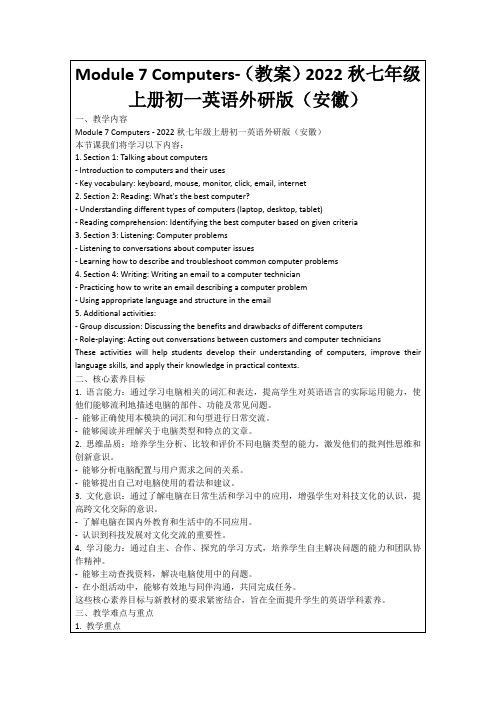
3.成果展示:每个小组将向全班展示他们的讨论成果和实验操作的结果。
(四)学生小组讨论(用时10分钟)
1.讨论主题:学生将围绕“电脑在日常生活中的应用”这一主题展开讨论。他们将被鼓励提出自己的观点和想法,并与其他小组成员进行交流。
2.引导与启发:在讨论过程中,我将作为一个引导者,帮助学生发现问题、分析问题并解决问题。我会提出一些开放性的问题来启发他们的思考。
-能够分析电脑配置与用户需求之间的关系。
-能够提出自己对电脑使用的看法和建议。
3.文化意识:通过了解电脑在日常生活和学习中的应用,增强学生对科技文化的认识,提高跨文化交际的意识。
-了解电脑在国内外教育和生活中的不同应用。
-认识到科技发展对文化交流的重要性。
4.学习能力:通过自主、合作、探究的学习方式,培养学生自主解决问题的能力和团队协作精神。
(二)新课讲授(用时10分钟)
1.理论介绍:首先,我们要了解电脑的基本概念。电脑是一种可以执行复杂任务的电子设备,它由硬件和软件组成。电脑在现代生活中扮演着极其重要的角色,无论是学习还是工作都离不开它。
2.案例分析:接下来,我们来看一个具体的案例。这个案例展示了如何根据不同需求选择合适的电脑,以及电脑如何帮助我们解决问题。
-听力理解的细节:在听力练习中,学生可能会在理解具体问题描述上遇到困难,如区分不同的电脑故障和解决方案。
-写作的逻辑结构:在撰写电子邮件时,学生可能不知道如何组织语言,清晰地描述问题和请求帮助。
-口语表达的流畅性:在讨论和角色扮演活动中,学生可能会在流利表达自己的观点和需求时遇到挑战。
初中英语外研版七年级上册《Module 7 Computers Unit 3 Language in

视察归纳
主语为其他人称时一样现在时态的句式变化
肯定 You speak English.
We live in the city.
否定 You don’t speak English.
We don’t live in the city.
疑问 Do you speak English?
Do you live in the city?
随堂练习
4.________tiger is a kind of tigers lives in ________.
A. Asian Asia B. Asia Asian C. Asia Asian
5.--______we go and see the pandas?
--Good idea. Let’s go.
能力提升
7 Present your poster to the class.
kangaroo strong feet/a pocket Australia Food: grass
This is a kind of animals called kangaroo, it has strong feet and a pocket on the front of its body. It lives in Australia, it eats grass.
cactacthches
bise
hhaavse
ttaakkees
ggeetts
朗诵摸索
Language practice It doesn’t eat meat. The tiger lives in Asia. Does it eat meat? No, it doesn’t. It eats plants.
外研版英语七年级上册M7-2《Computers》说课稿
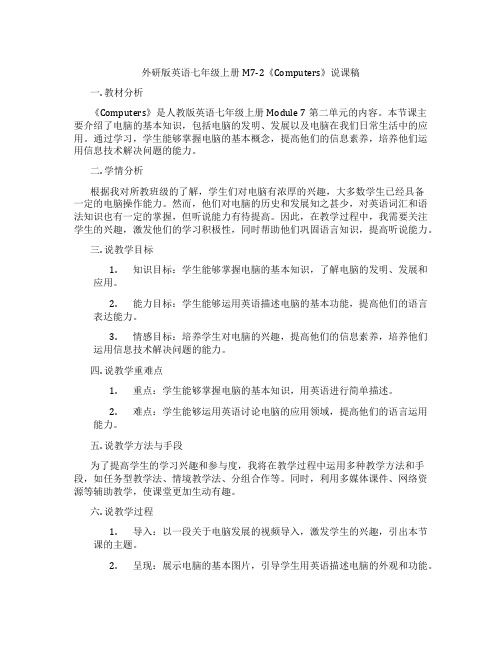
外研版英语七年级上册M7-2《Computers》说课稿一. 教材分析《Computers》是人教版英语七年级上册Module 7第二单元的内容。
本节课主要介绍了电脑的基本知识,包括电脑的发明、发展以及电脑在我们日常生活中的应用。
通过学习,学生能够掌握电脑的基本概念,提高他们的信息素养,培养他们运用信息技术解决问题的能力。
二. 学情分析根据我对所教班级的了解,学生们对电脑有浓厚的兴趣,大多数学生已经具备一定的电脑操作能力。
然而,他们对电脑的历史和发展知之甚少,对英语词汇和语法知识也有一定的掌握,但听说能力有待提高。
因此,在教学过程中,我需要关注学生的兴趣,激发他们的学习积极性,同时帮助他们巩固语言知识,提高听说能力。
三. 说教学目标1.知识目标:学生能够掌握电脑的基本知识,了解电脑的发明、发展和应用。
2.能力目标:学生能够运用英语描述电脑的基本功能,提高他们的语言表达能力。
3.情感目标:培养学生对电脑的兴趣,提高他们的信息素养,培养他们运用信息技术解决问题的能力。
四. 说教学重难点1.重点:学生能够掌握电脑的基本知识,用英语进行简单描述。
2.难点:学生能够运用英语讨论电脑的应用领域,提高他们的语言运用能力。
五. 说教学方法与手段为了提高学生的学习兴趣和参与度,我将在教学过程中运用多种教学方法和手段,如任务型教学法、情境教学法、分组合作等。
同时,利用多媒体课件、网络资源等辅助教学,使课堂更加生动有趣。
六. 说教学过程1.导入:以一段关于电脑发展的视频导入,激发学生的兴趣,引出本节课的主题。
2.呈现:展示电脑的基本图片,引导学生用英语描述电脑的外观和功能。
3.practice:通过小组讨论,让学生运用英语讨论电脑的应用领域,如学习、娱乐、工作等。
4.应用:设计一个电脑购物的情境,让学生在真实语境中运用英语进行交流。
5.总结:对本节课的内容进行总结,强调电脑的重要性和应用领域。
七. 说板书设计板书设计将包括电脑的基本知识、功能以及应用领域,以简洁明了的方式展示本节课的主要内容。
外研版英语七年级上册M7-3《Computers》说课稿

外研版英语七年级上册M7-3《Computers》说课稿一. 教材分析《英语七年级上册M7-3》是一篇介绍计算机发展史和计算机应用的阅读文章。
文章内容丰富,语言简单易懂,贴近学生生活。
通过学习本文,学生可以了解计算机的发展历程,掌握计算机的基本应用,并培养学生的阅读理解和信息获取能力。
二. 学情分析七年级的学生已经掌握了基本的英语语法和词汇,对日常生活话题有了一定的了解。
但他们在阅读理解方面还存在一定的困难,如词汇量不足、阅读速度慢、理解能力弱等。
因此,在教学过程中,教师需要关注学生的个体差异,充分调动学生的积极性,提高他们的阅读理解能力。
三. 说教学目标1.知识目标:学生能够掌握计算机的相关词汇,如mouse, keyboard,computer等;了解计算机的发展历程和基本应用。
2.能力目标:学生能够通过阅读理解文章,获取相关信息,提高阅读理解能力;能够运用所学知识进行简单的英语表达。
3.情感目标:培养学生对计算机科技的兴趣,激发他们学习英语的积极性。
四. 说教学重难点1.重点:计算机的相关词汇;计算机的发展历程和基本应用。
2.难点:阅读理解能力的培养;英语表达能力的提高。
五. 说教学方法与手段1.教学方法:采用任务型教学法,让学生在完成任务的过程中,掌握知识,提高能力。
2.教学手段:利用多媒体课件,图片,视频等丰富教学资源,激发学生兴趣,提高学习效果。
六. 说教学过程1.导入:通过展示计算机的图片,引导学生谈论计算机,激发学生兴趣。
2.呈现:展示文章标题和图片,引导学生预测文章内容。
3.阅读:学生自主阅读文章,教师提问,检查学生对文章的理解。
4.操练:学生分组讨论,用英语介绍计算机的基本应用。
5.输出:学生展示自己的讨论成果,教师给予评价。
6.总结:教师总结本文的主要内容和知识点,布置作业。
七. 说板书设计板书设计如下:1.计算机词汇:mouse, keyboard, computer等。
七年级英语上册Module7ComputersUnit1HowdoIwritemyhomeworkonthecomputer教案(新版)外研版
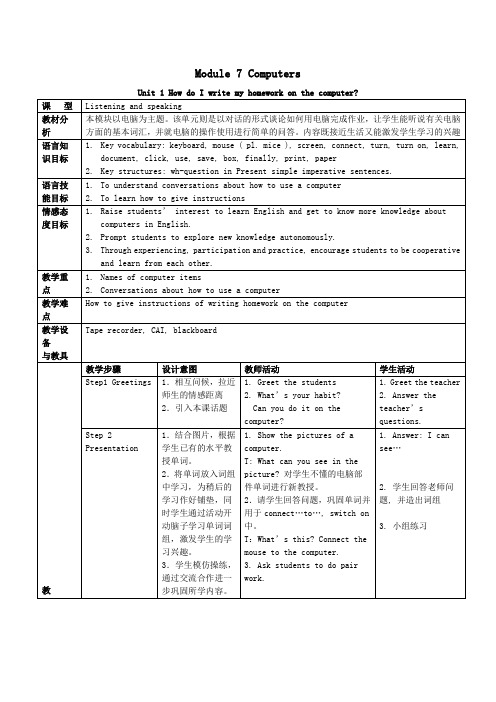
2. Answer the teacher’s questions.
Step 2
Presentation
1.结合图片,根据学生已有的水平教授单词。
2.将单词放入词组中学习,为稍后的学习作好铺垫,同时学生通过活动开动脑子学习单词词组,激发学生的学习兴趣。
3.学生模仿操练,通过交流合作进一步巩固所学内容。
Step8 Do exercises
A.重要短语:
1.把……连接……2.打开电脑3.在电脑上4.建立一个新文件
5.使用鼠标6.使用键盘7.点击新文件8.写下你的作业
9.保存文件10.放一些纸到那里11.打印文件12.关上电脑
Keys:1.connect…to…2. switch on/ turn on the computer 3. on the computer 4. open a new document 5. use the mouse 6. use the keyboard 7. click the new document 8. write your homework 9. save the document 10. put some paper in there 11. print the document 12. turn off the computer
4. Check together.
Step4
New words and expressions
1.新课程标准强调在语境中学习词汇和句型,任务设计使学生在理解上下文语境的基础上掌握单词和词组的意义和用法。
2.学生初步认识新单词和词组,并在教师的引导下,能尝试运用新词组。
初中英语外研版七年级上册《Module7 Computers Unit 3 Language in
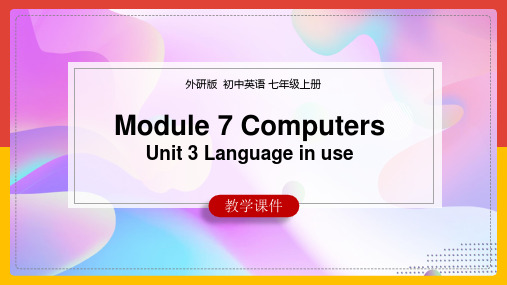
How often do you go to the library? Once a week.一周一次
一、特别疑问句的构成:是由“疑问代词或疑问副 词 + 一样疑问句”构成的。 二、注意:特别疑问句不能用yes或no来回答, 而应 根据它所询问的内容直接作答。
1. —Where does Kate write her homework? —In the school library.
Complete the sentences with the correct form of the words in brackets.
1. Tony _d_o_e_s_n_’_t _s_e_e (not see) his uncle, but he __s_e_n_d_s (send) emails.
Then, save the document.
Click “save” and write a name for it, click “save” again.
Finally, print the document. Click “print” and “OK”.
1. How do I write my homework on the computer?
Where do you save your homework?
When do you use a computer?
How many emails do you write every week?
Who do you write to?
a).I write to my friends.
b).I save my homework in a document.
4. —W__h_o__d_o_y_o_u__w_r_it_e__ emails to? — I write emails to my friends.
外研版英语七年级上册Module7 Computers 模块同步作文指导 课件
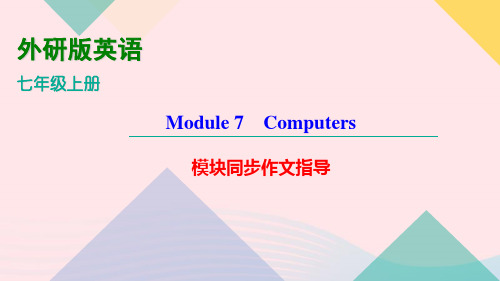
常用表达 1.There is a computer in my home,and my father and I share it. 2.He often talks to his customers on the computer. 3.He also goes on the Internet to check the times of trains,make travel plans,and buy tickets. 4.On the Internet,I search for information,do my homework and check my email. 5.I can see her and talk to her on the Internet. 6.I send email to my friends and play computer games.
热点作文练习
你有属于自己的电脑吗?平时你都会在什么时间使用电脑呢?你用电 脑主要是做些什么事情呢?请根据所给提示,写一篇短文。 提示:do one's homework,send,by email,listen to English news, watch English movies,never play computer games 要求:1.条理清楚、意思连贯、语句通顺、标点正确; 2.50~60词。
,
I_listen_to_English_news_or_watch_English_movies_on_the_computer.I_ne
ver_play_computer_games_because_my_parents_don't_like_it.
外研版英语
七年级上册
Mo使用为话题的文章
- 1、下载文档前请自行甄别文档内容的完整性,平台不提供额外的编辑、内容补充、找答案等附加服务。
- 2、"仅部分预览"的文档,不可在线预览部分如存在完整性等问题,可反馈申请退款(可完整预览的文档不适用该条件!)。
- 3、如文档侵犯您的权益,请联系客服反馈,我们会尽快为您处理(人工客服工作时间:9:00-18:30)。
Module 7 Computers
主题阅读
(A)
Dear Chris, [中小学教育教学资料]
How are you? I am sorry to hear about your job. Don’t worry! You’ll find a new one. You are clever and hard-working, so I don’t think you’ll have any problem. Hey, do you have MIRC? It is a program (程序) that lets you talk in the chat rooms (聊天室). Maybe we can have a time to chat online. I have got a digital camera (数码相机) ,so I’ll send you pictures of Barbara and me soon.
Let me know how everything goes with you.
Take care! [中小学教育教学资料]
David
根据短文内容,回答问题。
[中小学教育教学资料]
1. Who is the email to? [中小学教育教学资料]
_____________________________________
2. Who is the email from?
_____________________________________
3. Who has got a digital camera?
_____________________________________
4. What is MIRC?
_____________________________________
5. Who will find a new job?
_____________________________________
(B)
根据对话内容,用适当的动词填空。
A: Do you often 1. ______the computer? [中小学教育教学资料]
B: Yes, quite often.
A: What do you usually 2. ______ on the computer?
B: I can do many things. I often 3. ______ websites, so that I can 4. ______ a lot of information. I
5. ______ music, so I sometimes
6. ______ music from the Internet. And I also use the computer to do my homework.
A: Do your homework? How?
B:It’s easy. First, I 7. ______ the keyboard and the mouse to the computer. Then 8. ______ “new document” to 9. ______ a new document. I write my homework in the document. And after that I save it and print it out.
[中小学教育教学资料]
A: That’s interesting. Do you also 10. ______ emails?
B: Yes, I do. I email my friends in America every week.
(C)
Internet plays a very important role (角色) in everybody’s life. It makes the world different. But the Internet has some advantages and disadvantages .
First of all, if we need some information, we can get it online.
Online education is very important in our life. It can give us what we need, save our time, money and is convenient. Secondly, we can also exchange opinions (交换观点) and information with our classmates without leaving our house. Sometimes, if we feel very tired, we can listen to music.
But the Internet also has some disadvantages. The network games are bad for some young people. They stay in the net bar day and night. So, their studies are often bad.
In a word, Internet is an important part of our life. Only when we can make it serve our needs,it is useful. Can we get most useful information from it? Yes, if we use the Internet in a proper way.
1. What do we get from the Internet? [中小学教育教学资料]
A. A book.
B. Information that we need.
C. A child.
D. A doctor. [中小学教育教学资料]
2. What advantages does online education have?
A. Watch unhealthy videos. [中小学教育教学资料]
B. Plant vegetables and make more money.
C. Save time and money.
D. Play computer games day and night.
3. Do a few young people spend (花费) much time on network games?
A. Sure.
B. I am not sure. [中小学教育教学资料]
C. No, they don’t.
D. Yes, they do. [中小学教育教学资料]
4. What is the meaning of the underlined word “proper”?
A. 贫穷的
B. 合适的[中小学教育教学资料]
C. 肆无忌惮的
D. 贪婪的[中小学教育教学资料]
5. Which is TRUE according to the passage?
A. We can’t listen to music online.
B. We can’t chat with our classmates online.
C. Online education may waste more time. [中小学教育教学资料]
D. We can find a proper job by the Internet.
[中小学教育教学资料]
Module 7 Computers
主题阅读
(A) 1. It is to Chris. 2. It is from David. 3. David has got a digital camera.
4. It is a program that lets people talk in the chat rooms.
5. Chris will find a new job. [中小学教育教学资料]
(B) 1. use 2. do 3. visit 4. get 5. like 6. download 7. connect 8. click
9. open 10. send
(C) 1—5 BCDBD
Unit5 单元教学目标
教学目标与要求
1 能够理解、说出以下句子:It’s sunny today. Put on your cap. What’s in the box? It’s a dress. Can I help you? Please show me that jacket. Can we look at the blue shorts? Here you are. May I try the shoes on? Certainly.并在真实情景、现实生活中切步运用这些语言。
2. 能够正确地听、说、认读生词:blouse, jacket, raincoat, jeans;听、说、读、写生词:cap, T-shirt, hat, dress, sweater, skirt, shirt, shorts, socks, shoes;要求学生能初步运用这些词造句、编对话,进行日常交流。
3. 能够在真实语境中用英语进行购物,表达对衣物的喜好以及想试穿的意愿。
4. 能够学会基本的自主学习方法。
5. 能够初步形成与同伴合作学习的意识以及在商场购物的礼貌用语。
